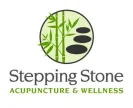![]()
This post is copied from our older, original blog. Original post date 5/31/2011.
By Marcie Bower, Lic.Ac.
As you have probably noticed from your acupuncture treatments at Stepping Stone, acupuncturists feel your pulses before starting treatment (and sometimes during or after!) Why do we do this?
We actually gain lots of information from the pulse that helps us to choose the most appropriate acupuncture points for your unique condition. Acupuncture, as a medicine, is based on energy flow in the body. All of the energetic systems in the body are reflected in different positions of the pulse.
To take the pulse as part of Traditional Chinese Medicine diagnosis, we use our right hand to feel your left pulse and our left hand to feel your right pulse. We feel your radial pulse in three different positions, in three different depths, on each of your wrists. When your pulse feels different in these different positions, it gives us information about what is going on in your body. For example, the front-most position on the right wrist (the position closest to your palm) corresponds to the Lung energy system. Because the function of the Lung in TCM is related to the immune system and getting sick, when you are coming down with a cold your pulse in the Lung position will be very superficial, just under the skin. When we feel this, we can use acupuncture to prevent the onset of a cold, even if you are not yet experiencing any symptoms.
Another example is the middle position on the right wrist, which corresponds to the Spleen/Stomach energy system. The spleen and stomach, as we have discussed in previous posts, govern the digestive system. In someone who is experiencing digestive disturbances, this pulse position will provide us with valuable information about the nature of their condition. For example, if the pulse in that middle right position is very weak, we know that we need to work on building up the Spleen energy to help the patient through the problem. A weak Spleen/Stomach pulse probably correlates with such symptoms as chronic diarrhea, bloating and gas, fatigue after eating, or IBS. However, if the right middle pulse position feels overly strong and fast, we will conclude that the digestive problems are likely excess in nature, and our treatment will instead focus on dispersing the excess energy and cooling down the digestive system. Symptoms of this condition may manifest as acid reflux, ulcers, stomach cramping, or nausea.
We also feel for the speed, depth, width, and quality of your pulse, and all of these factors tell us about how the energy in your body is moving and functioning. There are numerous different pulse qualities that we feel for…some people have a “wiry” pulse, which feels like a guitar string, and often indicates some pathology relating to stress. Sometimes pulses are “slippery” – they feel like rolling beads through oil. This can mean many things, including congestion in the body, an abnormal accumulation of fluids, or even pregnancy. Other pulses are “choppy” – they feel like ocean waves when a storm is coming. These pulses often indicate a weakness in the blood energy of the body, which can cause problems with sleep, anxiety, and infertility.
Pulse-taking provides us acupuncturists with the information that we need to formulate the correct treatment for your unique condition. Just as no two persons’ fingerprints are the same, no two persons’ pulses are the same. Moreover, your pulse will not be exactly the same next week as it is this week. It is a perfect reflection of the uniqueness of your condition at any single moment in time.
Additionally, we have treated patients who do not speak the same language as we do, patients who could not talk speak (babies, post-surgery patients with their jaw wired shut, post-stroke patients with aphasia), and patients who chose not to share much about their health during a verbal interview. Being able to understand the language that the body speaks has enabled us to be able to treat in these situations. And the pulse is one of the most valuable ways that the body speaks to us.

